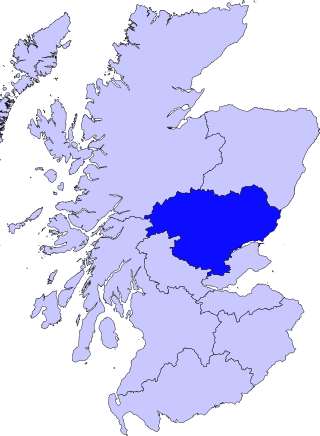John McAllion is a campaigner for the Scottish Socialist Party, as well as a former Labour Party Member of Parliament (MP), Member of the Scottish Parliament (MSP), and convenor of Tayside Regional Council. He is also convener of the Scottish Fairtrade Forum.

Tayside was one of the nine regions used for local government in Scotland from 16 May 1975 to 31 March 1996. The region was named after the River Tay.
Alasdair Neil Morgan is a former Scottish National Party (SNP) politician. He was Deputy Leader of the Scottish National Party from 1990 to 1991 and served in the House of Commons as the Member of Parliament for Galloway and Upper Nithsdale from 1997 to 2001. He was elected in 1999 as a Member of the Scottish Parliament (MSP) for Galloway and Upper Nithsdale. From 2003 to 2011, he served as a member for the South of Scotland region.

Scottish Labour, officially the Scottish Labour Party, is the part of the UK Labour Party active in Scotland. Ideologically social democratic and unionist, it holds 22 of 129 seats in the Scottish Parliament and 37 of 57 Scottish seats in the House of Commons. It is represented by 262 of the 1,227 local councillors across Scotland. The Scottish Labour party has no separate Chief Whip at Westminster.
Neil Murray Tosh is a retired Scottish Conservative Party politician who served as a Member of the Scottish Parliament (MSP) for the South of Scotland region (1999–2003) and the West of Scotland region (2003–07).

John Ross Letford MBE is a Scottish politician who served as the Lord Provost of Dundee, as well as a councillor in his local ward of Lochee, until May 2012. His eleven years as Lord Provost made him the longest serving civic head in the United Kingdom since the nineteenth century. He currently resides in the Charleston area of the city.

The 2011 Scottish Parliament election was held on Thursday, 5 May 2011 to elect 129 members to the Scottish Parliament.

The 2007 Scottish Parliament election was held on Thursday 3 May 2007 to elect members to the Scottish Parliament. It was the third general election to the devolved Scottish Parliament since it was created in 1999. Local elections in Scotland fell on the same day.

A Glasgow Hillhead by-election was held on 25 March 1982. The by-election was caused by the death of the Conservative Party Member of Parliament for Glasgow Hillhead Tam Galbraith on 2 January 1982.

The City of Glasgow was a local government district in the Strathclyde region of Scotland from 1975 to 1996.

Regional elections were held in Scotland on Thursday 8 May 1986, under the terms of the Local Government (Scotland) Act 1973. The previous elections had been held in 1982. The elections took place a year before the Conservative's third general election victory. Elections took place in England and Wales on the same day.

The 2016 Scottish parliament election was held on Thursday, 5 May 2016 to elect 129 members to the Scottish Parliament. It was the fifth election held since the devolved parliament was established in 1999. It was the first parliamentary election in Scotland in which 16 and 17 year olds were eligible to vote, under the provisions of the Scottish Elections Act. It was also the first time the three largest parties were led by women.
Events from the year 1986 in Scotland.

Elections to Strathclyde Regional Council were held on Thursday 6 May 1982, on the same day as the eight other Scottish regional elections. This was the third election to the regional council following the local government reforms in the 1970s.

The 2017 Scottish local elections were held on Thursday 4 May, in all 32 local authorities. The SNP retained its position as the largest party in terms of votes and councillors, despite suffering minor losses. The Conservatives made gains and displaced Labour as the second largest party, while the Liberal Democrats suffered a net loss of councillors despite increasing their share of the vote. Minor parties and independents polled well; and independent councillors retained majority control over the three island councils. For the first time since the local government reforms in 1995, all mainland councils fell under no overall control.

Elections for the City of Edinburgh District Council took place on Thursday 3 May 1984, alongside elections to the councils of Scotland's various other districts.

The fourth election to Lothian Regional Council was held on 8 May 1986 as part of the wider 1986 Scottish regional elections. The Lothian result was little different from the wider Scottish results, which saw Labour making strong gains across Scotland. In Lothian this allowed Labour to secure their majority on the 49-seat council.
Elections for the City of Glasgow District Council took place on 3 May 1977, alongside elections to the councils of Scotland's various other districts. These were the second elections to the City of Glasgow District Council, and saw Labour losing their control of the council, losing nearly half of their councillors. Among the losing councillors was Dick Dynes, the Labour group leader. Dynes was replaced as leader by Jean McFadden.
The sixth and last election to Tayside Regional Council was held on 5 May 1994 as part of the wider 1994 Scottish regional elections. The election saw the Scottish National Party overtaking Labour to become the council's largest party, and following the election the SNP formed a minority administration. The Conservatives lost 10 seats and became the third largest party. 8 weeks later, leader of the council Lena Graham resigned 'for personal reasons' and Ewan Dow took over as council leader.
The 1980 City of Glasgow District Council election took place on 1 May 1980, alongside elections to the councils of Scotland's various other districts. This was the third election to the City of Glasgow District Council.











